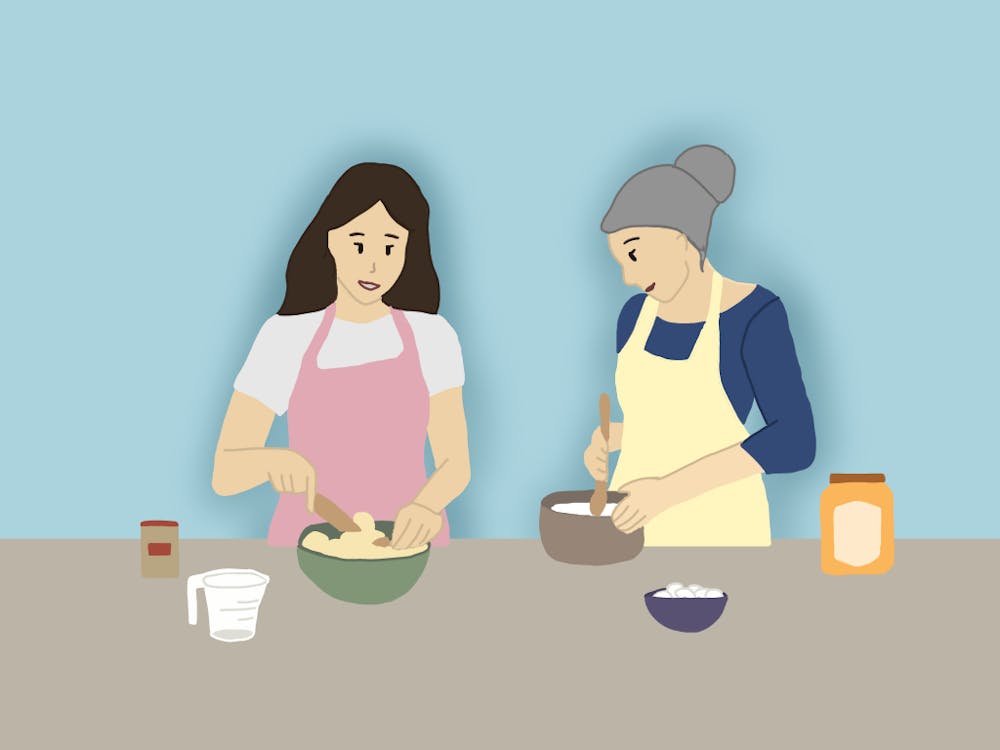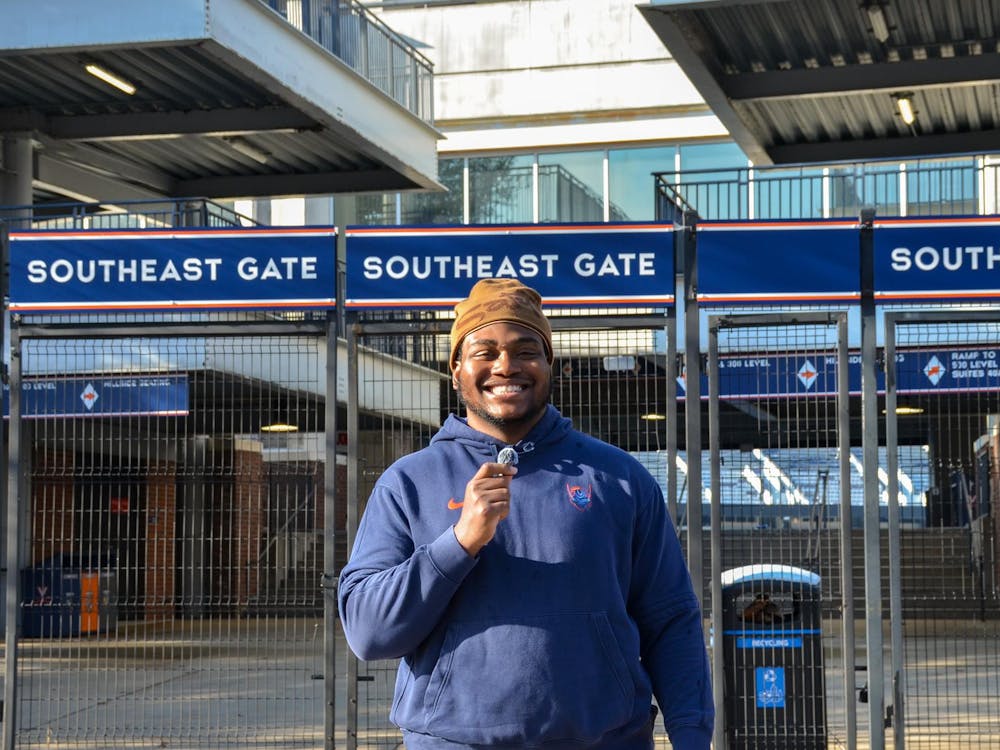Sarah Jobe learned to read on the Bible. She spent four days a week at her Southern Baptist church during her childhood. By seventh grade she said she felt called to "a life of missions and ministry." And by 11th grade she knew how she was going to answer that call: by becoming a pastor.
But when the Memphis, Tenn., native arrived at the University her first year, she embarked on a two-year process of defining her beliefs.
"I'd gotten to the point where I felt like I knew all the Sunday school answers," said Jobe, a third-year College student. "I really wanted to find God on my own terms, so I purposefully did not go to church my first year."
Like the day-to-day decisions of whether to go to class or sleep in, or whether to party on a Thursday night, the decision to pursue a religion in college reflects the same choices and freedoms that are associated with life away from home.
Finding a new faith, abandoning old routines and challenging one's convictions are options that might have been limited by familial demands or personal expectations before going away to school. But now it's an individual's choice.
|
"I think that's what college is about," Religious Studies Professor Heather Warren said, "exploring things you never had the chance to explore before, doing things you never had the chance to do, and doing it at a very formative time in one's life."
On the first day of Warren's Religion 101 class she asks students to take out a sheet of paper and explain why they are taking her course.
From those responses, she said she has found that "some of them take classes in our department to deepen their faith, maybe to challenge it" and that "for those who are new or strangers to life with religion, they take it because they are curious."
Enrollment in religious studies courses has increased steadily for many years, Department Chairman Harry Gamble said. Anywhere from 2,300 to 2,900 students take courses in the department each semester, he said.
"The subject itself is inherently captivating," Warren said. "It's a time to ask and hear how others have answered the big questions."
Building a new foundation
It had been a heated summer of 2000 in Memphis.
When Jobe came downstairs on her first morning at home on summer break, a proposal by the Southern Baptist Convention to ban women from the ministry screamed out from the newspaper's front page.
From that moment on she spent the next several months rallying support to fight the decision that could threaten her future as a female pastor. A city-wide prayer response that she organized garnered national media attention and she also began a letter-writing campaign to Adrian Rogers, the Memphis pastor who initiated the proposal.
With the frustrating yet eye-opening events of that summer behind her, Jobe returned to the University in the fall ready to take the next step in her journey and look for a church.
"I was coming into my own beliefs and felt comfortable with those," she said, "and I realized that fellowship with other Christians and hearing other people's opinions on God is very important."
But while her search for a church spanned her second year and several denominations, she said she felt unsatisfied with what she was finding.
And so Jobe decided to start her own.
As an intern with the American Baptist Convention, a more liberal branch of the Baptist church, Jobe is working with a minister to establish a new church in Charlottesville.
It's a community, Jobe said, where she feels "at home," and where she finds that she can challenge her faith by "dealing with all the tough questions that I never felt like anyone wanted to answer in Sunday school."
But Jobe still is not about to give up on her Southern Baptist identity. She hopes her work with this church will enable her to return to her Southern Baptist roots and "really be an effective agent for change."
"So I've made a huge swing back and forth," said Jobe, who now works with the American Baptist church every day. "But it's a swing I needed to make. I needed to be with God on my own."
A change of faith
Upon entering the University, Mike Lockaby was a baptized Catholic who thought he was going to be a government and economics major.
Now the fourth-year College student is working on his senior thesis for religious studies, which he's double majoring in with history.
And he's Episcopalian.
"I guess at some point you feel as though it's the right thing," Lockaby said of his choice to convert last spring. "You've found something which is better than what you've done in the past and you see no reasonable possibility of there being anything better."
After a fairly relaxed Catholic upbringing in New Hampshire, where he said he had "no feel for" or "interest" in the religion, Lockaby looked at other options his first year.
As he grew fascinated with the field of the history of ideas, he also was intrigued by a girlfriend's Christian fundamentalist faith.
"And so I got sucked into all these ideas, and then seeing how this girl that I dated - about her faith and how amazing it was - I started to get more into it," Lockaby said.
Though he didn't feel comfortable with fundamentalist faith and he gradually grew away from a Christian fellowship group he joined, he gravitated toward other religious ideas.
"To me [religion is] more about character than method," he said. "I had another friend who was an avid Episcopalian and the Episcopal church really shares that attitude that everything's about character, not method."
Religious studies classes also have played a large part in how his personal theology has changed since first year, Lockaby said.
"If you're going to be intellectually lazy and just let beliefs be beliefs, okay, that's fine, that's good enough. But it's not good enough for me, and I don't think it should be good enough for any thinking person," he said.
Cultural community
After her mom called, worried that she wouldn't be going to synagogue for Rosh Hashana her first month at college, Deb Pink obligingly went with a few friends to services for the Jewish new year.
It wasn't too long after, though, that she realized the choice was hers.
"And I said, well, wait a sec. I really don't have to go if I don't want to," recalled Pink, a fourth-year College student.
As one of a handful of Jewish kids growing up in Halifax, Nova Scotia, going to Hebrew classes was almost as familiar as gazing out at the North Atlantic.
But beyond the doctrine, it was the huge family gatherings for high holiday dinners that rooted Pink in the religious traditions that she feels she has rediscovered during her time at the University.
There was the Passover dinner she spent with a friend in Richmond during her second year. Then there was the Jewish Heritage Program gathering that she showed up to last spring, where she said she enjoyed "connecting with other people of the same background."
And this semester, Pink said the Jewish studies course "Feasting, Fasting and Faith" has been one of the "best and biggest" turning points in reconnecting with her Jewish heritage.
"That's something that was a huge part of my growing up," Pink said of those family gatherings. "The class has changed me. It has made me a lot more aware of my past and a lot more aware of how I want to raise a family."
And while Pink said she is more in touch with her Jewish cultural identity, she does not know if she believes in its religious aspects.
"Where I am now doesn't have so much to do with the holy texts and the laws," she said. "I think it's more of a culture for me. It's more of a community."
As students adapt to and mold the environment around them, the questions they ask of their friends, professors and themselves can lead to multiple avenues of personal discovery between convocation and graduation.
"You can see a person's life change in the course of four years over college," Warren said, "and so third and fourth year, you're in a different place - a different personal, psychological, most likely spiritual, place - than when you entered"






